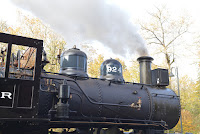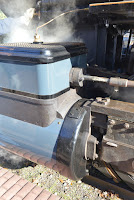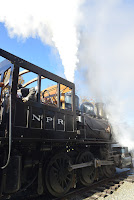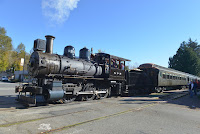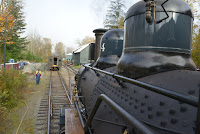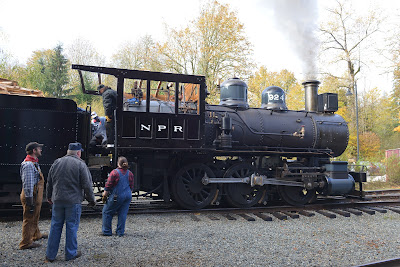The Northwest Railway Museum has substantially completed a major rehabilitation effort on steam locomotive 924. Sunday, November 1, 2020 was a beautiful fall day in the Snoqualmie Valley, and the 924 was under steam to pull its first passenger train in more than 40 years. This momentous occasion occurred six years to the day after the locomotive was retrieved from long term storage and moved to the Museum’s Conservation and Restoration Workshop.
History – Locomotive 924 was a product of the Rogers Locomotive and Machine Works, and is a light switcher with an 0-6-0 wheel arrangement. It was built in 1899 for the St Paul and Duluth in Minnesota, but by 1901 it was under ownership of the Northern Pacific Railway and was reassigned to the Puget Sound region. It served in Western Washington until 1923 and went on to serve the Inland Empire Paper Company near Spokane.
Highlights – During its first 24 years of service, the locomotive saw a numerous changes, many of which were required to correct damage caused by dock failures, switching accidents, and regulatory changes. As part of the effort to research and recognize the importance of the 924, it was nominated to the King County and City of Snoqualmie Landmarks Register. For the restoration efforts, a period of significance between about 1906 and 1908 was selected allowing a replica of the second cab (it had at least three) to be fabricated and installed. The selection of that period also dictated the selection of a headlight, lettering style, size and location of air tanks, pilot beam size and shape, the boiler jacketing material, location of running board, and the appearance of the spot plate on the smokebox front.
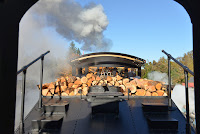 Selecting a fuel – The 924 was built to burn coal, a fuel that transformed the world in an industrial revolution. Coal is not readily available in Western Washington, and it has some negative environmental implications. So the Museum has committed to burning wood products instead of coal. For the time being, 924 is burning Douglas fir firewood, and lumber cutoffs from the Conservation and Restoration Workshop.
Selecting a fuel – The 924 was built to burn coal, a fuel that transformed the world in an industrial revolution. Coal is not readily available in Western Washington, and it has some negative environmental implications. So the Museum has committed to burning wood products instead of coal. For the time being, 924 is burning Douglas fir firewood, and lumber cutoffs from the Conservation and Restoration Workshop.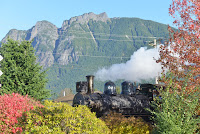 Performing the work – Much of the effort to rehabilitate a steam locomotive could be characterized as loosely directed labor accentuated with highly skilled machining. The total effort may approach 20,000 hours, but some aspects of the work have entailed a significant learning curve. And certainly it would not have been possible to undertake the work without highly skilled individuals including Jon B., Gerry P., Steven B., Josh K., Gary J., Brian W., Mike D., Lyle E. and others. Together, they have conspired to overcome the secrets of a largely forgotten manufacturing process completed more than 121 years ago.
Performing the work – Much of the effort to rehabilitate a steam locomotive could be characterized as loosely directed labor accentuated with highly skilled machining. The total effort may approach 20,000 hours, but some aspects of the work have entailed a significant learning curve. And certainly it would not have been possible to undertake the work without highly skilled individuals including Jon B., Gerry P., Steven B., Josh K., Gary J., Brian W., Mike D., Lyle E. and others. Together, they have conspired to overcome the secrets of a largely forgotten manufacturing process completed more than 121 years ago.Funding the work – Steam locomotive rehabilitation is costly work, and for the 924 is valued at more than $700,000. The effort would not be possible without generous support from individuals, foundations, companies, and public funders, but also the generous volunteers who donated their time and talents. Washington Heritage Capital Fund was the largest funder. Important support was received from hundreds of individuals, King County 4Culture, The Emery Rail Heritage Trust, Northern Pacific Railway Historical Association, Osberg Family Foundation, the Schwab Fund, Boeing Match, Microsoft Match, and more. The Northwest Railway Museum is very grateful for this generous support.
Watching the spectacle – A key objective in rehabilitating a steam locomotive is to be able to demonstrate it for the public. The 924 will still require ongoing work – budgets were just not large enough to replace or renew every working part, which could easily have exceeded costs of more than $1 million. However, the locomotive is compliant with applicable regulations and will be operating regularly on the Museum’s interpretive railway between North Bend and Snoqualmie Falls. The locomotive will make another appearance later this year, and then appear regularly in 2021.

